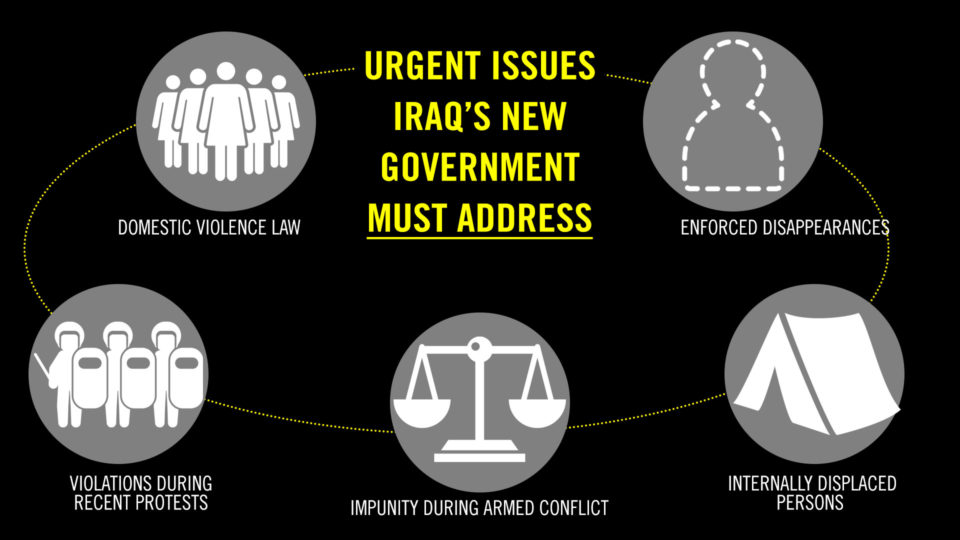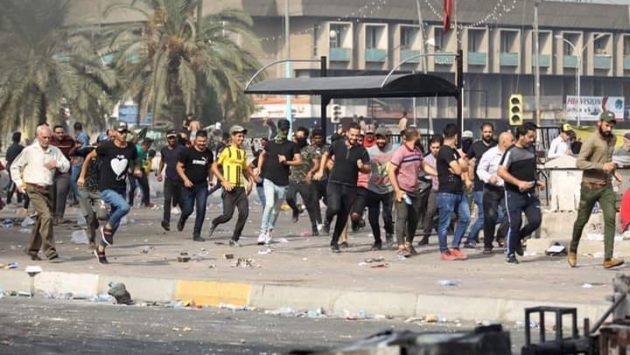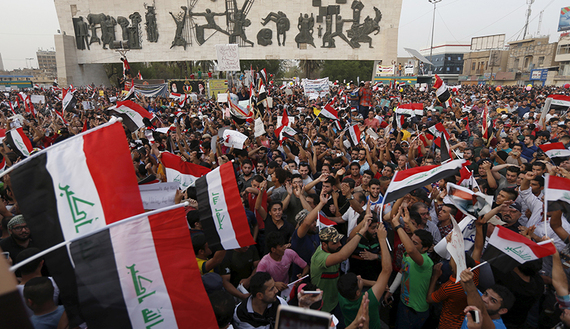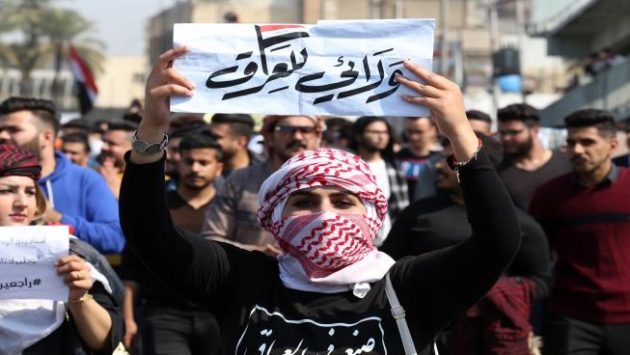Iraq’s New Government Must Deliver on Promises to End Impunity for Deaths and Human Rights Violations of the Protesters
The Iraqi Civil Society Solidarity Initiative (ICSSI) has supported the non-violent protesters who have been demonstrating since October 1, 2019 for economic reform and employment, reliable public services, an end to corruption, credible elections and reform of the political system. The violence, killings, and violations of freedom of expression and assembly with which government and non-government forces responded to the protests must be investigated and those responsible held accountable. Prime Minister Al-Kadimi’s announced commitment to end impunity and address Iraqis’ longstanding social, economic and political grievances must immediately translate into meaningful action.
In support of an end to decades of impunity and true reform, the ICSSI is endorsing Amnesty International’s “Open Letter to Iraq’s New Prime Minister” below.
AMNESTY INTERNATIONAL PUBLIC STATEMENT
7 May 2020 MDE 14/2290/2020
IRAQ: OPEN LETTER TO IRAQ’S NEW PRIME MINISTER Dear Prime Minister
Amnesty International takes the opportunity of your appointment as Iraq’s new Prime Minister to share with you Amnesty International’s longstanding human rights concerns in Iraq and to urge you and your newly formed government to do your utmost to ensure that the promotion and protection of human rights in Iraq is prioritized.
The organization fully recognizes the security, political and economic challenges currently facing the Iraqi people and government as the country recovers from the recent armed conflict involving the armed group calling itself the “Islamic State” (IS) as well as the unprecedented pressure facing countries around the world in combatting the spread of COVID-19. Amnesty International notes and welcomes the assurances announced in the programme of your government approved by the Iraqi parliament to ensure justice for the loss of lives of protesters as well as support for the internally displaced.
The cycle of human rights abuses which have been committed across Iraq and the impunity enjoyed by perpetrators contribute to the perpetuation of violence and chronic insecurity. Tackling impunity, by taking concrete steps towards justice and accountability, is essential. Specifically, it is imperative that your government secures: accountability for the unlawful killing and injuring of thousands of protesters since October 2019; an end to the collective punishment of internally displaced Iraqis; and disclosure of the fate and whereabouts of thousands of men and boys who were forcibly disappeared during the conflict against IS.
We urge you and your government to ensure that accountability for human rights violations that have been inflicted on the Iraqi people is prioritized and that those responsible are brought to justice without delay in fair trails without recourse to the death penalty.
VIOLATIONS IN THE CONTEXT OF THE MOST RECENT PROTESTS
Most recently, Amnesty International documented an unprecedented crackdown on largely peaceful protesters across Iraq since the eruption of protests one 1 October 2019. Official figures estimate over 500 Iraqis were killed, while unofficial estimates state that this number has passed 600 – a figure referred to most recently by the President of Iraq, Barham Salih, on 20 January 2020. Thousands more have been injured.
According to documentation carried out by Amnesty International, security forces, including members of the Popular Mobilization Units (PMU) as well as unknown gunmen, attacked the largely peaceful protesters with live ammunition, hunting rifles, live fire consistent with sniper fire, tear gas and water cannons.
In Baghdad, anti-riot forces launched previously unseen types of tear gas grenades into crowds in a manner that witnesses said was intended to kill rather than disperse protesters. The grenades were 10 times heavier than regular tear gas canisters, killing almost instantly nearly all those hit by them.
In the context of the protests, intelligence and security forces, including factions of the PMU, who have systematically targeted anyone speaking out against the conduct of security forces, carried out a campaign of intimidation that targeted protesters, lawyers, medics and journalists. In many cases, activists were threatened, beaten, and forced to sign pledges to cease protesting, before being released from detention. Dozens of protesters and activists from several governorates, were abducted and forcibly disappeared by security forces for periods of days and weeks.
Amnesty International notes that the Iraqi authorities in October 2019 ordered an investigation into the use of lethal force against protesters during 1 – 9 October 2019. However, the security forces, including members of the PMU and other armed actors, have continued to unleash lethal violence on largely peaceful protesters with total impunity.
Iraqi authorities must urgently rein in security forces, remove those accused of responsibility for serious violations and initiate thorough, independent investigations aimed at bringing accountability and redress for victims and their families. The authorities have had months to change course away from violent repression. The new government must reassure protesters that they have a right to expect that the security forces will protect them and not arbitrarily kill and maim them, and that their government will address their grievances, particularly their demands for their social and economic rights to be met.
IMPUNITY FOR VIOLATIONS IN THE CONTEXT OF THE ARMED CONFLICT AGAINST IS
As you may be aware, the organization has documented and condemned in the strongest terms the war crimes committed by IS. However, the organization has also documented grave human rights violation and violations of international humanitarian law, including war crimes, committed against Iraqi civilians by all other parties to the conflict, namely Iraqi security forces, including the PMU, members of the Tribal Mobilization Units (TMU), as well as Kurdish Peshmerga forces under the authority of Kurdistan Regional Government (KRG). While attacks by IS still pose a threat to civilian lives in Iraq today, your government must act decisively to end the patterns of gross violations of human rights that have occurred throughout the conflict with IS and in its aftermath and to ensure justice and reparation for victims.
It is extremely disheartening that more than two years after the Iraqi authorities declared an end to the armed conflict against the IS in Iraq on 7 December 2018, not only have past violations not been addressed, fueling a state of permanent impunity and normalization for abuses, but serious violations against Iraqis are ongoing, with victims including both those who continue to be internally displaced and those who have returned to their areas of origin.
ENFORCED DISAPPEARANCES
In the context of the armed conflict against IS in Iraq, thousands of men and boys fleeing IS-held territories towards Iraqi security forces were separated from their families and arbitrarily arrested as a result of seriously flawed screening processes and subsequently subjected to enforced disappearance. To date, the fate of these men and boys remains unknown. In one of the starkest examples of this, at least 643 men and boys from the area of Saqlawiya in the Anbar governorate, remain missing after members of the PMU abducted them in June 2016. The abductions happened during military operations to retake Falluja and surrounding areas from the control of IS. Their fate remains unknown to date despite the announcement, on 5 June 2016, by the Office of then-Prime Minister, Haider al-Abadi, of the establishment of a committee to investigate disappearances and abuses committed in the context of military operations to retake Falluja.
The new government must demonstrate that, unlike its predecessors, it is determined to end entrenched impunity for violations of human rights, including by ending arbitrary arrests and enforced disappearances by security forces and militias; and it must reveal the fate and whereabouts of those who were forcibly disappeared in the context of the armed conflict against IS. In addition, government must expedite passage by the Parliament of a draft law, first presented in 2015, to incorporate the provisions of the International Convention for the Protection of All Persons from Enforced Disappearance, which Iraq ratified in 2010, into national legislation
INTERNALLY DISPLACED PERSONS (IDPS) WITH PERCEIVED AFFILIATION TO IS
While the organization notes that humanitarian actors have reported that over four million Iraqis displaced by the recent conflict have returned to their areas of origin, the rate of returns has stagnated and over 1.5 million remain displaced in camps and informal settlements.
Armed actors, including members of security and intelligence forces, as well as the PMU, continue to subject internally displaced families, most of whom are headed by women, to collective punishment due to their perceived affiliation to IS – a factor that is outside the control of these families.
Namely, internally displaced families with perceived affiliation to IS continue to face obstacles at the hands of security forces and armed actors in accessing civil status documentation. This restricts their freedom of movement and their access to employment and public services, including education for their children, leaving them destitute and dependent on dwindling humanitarian assistance in IDP camps and informal settlements. Men and boys from these families continue to face acute risks of arrest and enforced disappearance from camps, checkpoints as well as in their areas of origin, due to a perceived affiliation to IS. When attempting to return to their areas of origin, these families are refused entry to their areas of origin.
The decision by Iraqi authorities in August and September 2019 to abruptly close camps for internally displaced people in Anbar and Ninewa governorates forced those affected to move to nearby consolidated camps or return to their areas of origin. This violated their right to voluntary, dignified and safe return. Many families were displaced for a second time and were hard to reach and track by humanitarian agencies after local authorities and security actors refused them entry to their areas of origin. These families are often evicted and have their properties confiscated, while many women from these families face sexual harassment at the hands of armed actors and members of security forces.
A sustainable and just end to the cycles of conflict and atrocities in Iraq, requires action by this government to end the mistreatment, marginalization and abuse of vulnerable communities, including through stopping the collective punishment of families with perceived affiliation to IS.
YEZIDI SURVIVIORS OF IS CRIMES
Amnesty International has systematically documented the mass atrocities committed by IS against n the civilian population in Iraq, including the targeting of ethnic and religious minorities, including Christians and Yezidis in northern Iraq. More than two years since Iraqi authorities declared victory over IS, Yezidi women and girls are left with harrowing physical and psychological trauma as a result of sexual violence and enslavement by the armed group. Yezidi children who survived IS captivity are also in need of sustained psychological and social support and health care after being subjected by the armed group to grave human rights abuses such as abduction, torture, enslavement and forced conscription. Thousands continue to be displaced and live with the torment of not knowing the fate and whereabouts of their relatives who went missing as IS killed hundreds of men and abducted thousands of Yezidi women, girls and boys.
Getting the psychological and medical support needed has been especially difficult due to financial and accessibility issues. Given the tens of thousands of dollars many Yezidi families had to pay to secure the release of their relatives, these families cannot afford to get the support they need. To compound this, Iraqi bureaucracy limits access to services by requiring specific civil identification documents, which many lost in the IS attack.
PROTECTING THE MOST VULNERABLE DURING COVID-19 LOCKDOWNS
Finally, Amnesty International notes the measures put in place by Iraqi authorities in combatting the spread of COVID-19, including the implementation of what is now a partial lockdown.
This period of lockdown, however, has exacerbated the vulnerability of women and girls, including from the violence in the home. The uptick in cases of domestic violence reported by media and civil society organizations, in some instances leading to the death of women and the severe injuring of a young girl, demands immediate action by the government to ensure that women and girls can access essential services and protection.
Furthermore, we take this opportunity to urge you to ensure measures to protect IDPs – in camps and unofficial sites and settlements – are heightened, taking into consideration that these displaced families are often solely dependent on humanitarian aid, and face financial and security related hindrances to their freedom of movement, which impacts theirs access to services, including medical care.
We note the government’s measures to reduce overcrowding in prisons in light of the threat posed by COVID-19 to prisoners. We urge you to take additional steps, including immediately and unconditionally releasing all those imprisoned solely for exercising their right to freedom of expression, peaceful assembly or other human rights; authorities should examine cases of people in pre-trial detention as well as women and girls who are in detention with their dependent children or who are pregnant, with a presumption to release, unless exceptionally strong factors weigh against it. Authorities should urgently release children from any form of detention, unless it is specifically justified. Efforts should be made to release older detainees and prisoners with underlying medical conditions. In addition, those convicted of minor offences should also be considered for release.
In any event, authorities must ensure prompt and regular access to medical attention and adequate health care for all prisoners at a standard that is comparable to what is available in the community. This includes protection against contracting COVID-19, including ensuring that all detention facilities are equipped with sufficient and functioning sanitizing equipment and/or other relevant facilities for physical hygiene.




